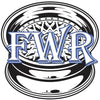Quality aluminum alloy wheels are made through a precise manufacturing process to ensure durability, strength, and a high-quality finish. Factory Wheel Replacement uses a proven manufacturer with the best of industry technology and standards. Here's an overview of how quality aluminum alloy wheels are typically made:
-
Material Selection:
- The process starts with the selection of high-quality aluminum alloy. Aluminum is chosen for its lightweight properties and corrosion resistance.
- Our alloy wheels are made from A356 Aluminum Alloy. This alloy is often used in the casting process to create wheels. It has good castability and offers a balance of strength and corrosion resistance. It's frequently used in the production of both aftermarket and OEM wheels.
-
Melting and Casting:
- The selected aluminum alloy is melted in a furnace at high temperatures.
- Once molten, the alloy is poured into wheel-shaped molds. These molds are usually made of steel and have the negative shape of the wheel.
- Most wheels are cast, but some are forged aluminum alloy. Forged wheels are known for their exceptional strength and lightweight properties, making them a popular choice for dually trucks, high-performance, and luxury vehicles.
-
Heat Treatment:
- After casting, the wheels go through a heat treatment process known as T6 heat treatment. This strengthens the aluminum and improves its mechanical properties.
-
Machining and CNC Milling:
- The wheels are then subjected to machining processes where excess material is removed, and the design is refined. CNC (Computer Numerical Control) milling machines are often used for precision machining.
-
Types of Wheel Finishes:
- Wheels are often coated with a layer of paint or powder coating for aesthetics and protection against corrosion.
- Some wheels also undergo a polishing process for a shiny, mirror-like finish.
- Our painted, machined, and polished finish wheels include a durable protective clearcoat.
- Our chrome plated wheels are triple plated. The "triple plated" designation comes from the fact that the object undergoes three distinct plating steps, with copper, nickel, and chrome layers applied sequentially. This 3-step process creates a smooth and durable finish that is long-lasting.
- PVD (Physical Vapor Deposition) chrome is applied through a vacuum deposition process. During PVD, the object to be coated is placed in a vacuum chamber. Various metal compounds, often titanium nitride or zirconium, are vaporized in the chamber. These vaporized metal ions then bond to the surface of the object, forming a thin, highly adherent layer.
- A Chrome Clad wheel is a type of wheel used in the automotive industry that combines the appearance of a traditional chrome-plated wheel with the durability and ease of maintenance of a standard alloy wheel. Chrome Clad wheels are typically constructed with a composite design, featuring a core made of aluminum alloy or steel and an outer layer or "cladding" made of chrome-plated plastic or other synthetic materials.
-
Quality Control and Testing:
- Quality control measures are implemented throughout the manufacturing process. This includes visual inspections, dimensional checks, and material integrity tests.
- Our reproduction wheel manufacturer is quality certified by ISO9001, QS9000, TS16949 and is a one of the leading manufacturers of reproduction aluminum alloy wheels serving the wheel industry today.
- Our wheels are made to JWL or higher standards. The JWL standard (Japan Light Alloy Wheel standard) is a set of requirements for alloy wheels set by the Ministry of Land, Infrastructure, Transport, and Tourism of Japan that must be met for all passenger cars in Japan. The JWL mark, cast or forged into the wheel, indicates that the wheel has been self-certified by its manufacturer to meet the standard. Our reproduction wheels are manufactured to these standards or better.
- Our replacement wheels undergo testing for factors such as radial and lateral runout, balance, load-carrying capacity, and finish salt tests to ensure they meet industry standards.
-
Packaging and Distribution:
- Once the wheels pass quality control and testing, they are packaged and prepared for distribution to retailers, dealerships, or directly to customers.
It's important to note that the quality and performance of aluminum alloy wheels can vary depending on the manufacturer's processes and the specific alloy used. Premium manufacturers often invest in advanced casting and machining techniques, resulting in wheels that are not only strong and durable but also lightweight and aesthetically pleasing. These high-quality wheels are often sought after by automotive enthusiasts and manufacturers alike.




